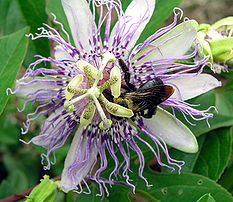 Passion flower is a native plant of North America, where it has been used for centuries as a mild sedative. It was later used in Europe and adopted by herbalists to treat insomnia, hysteria and epilepsy, and used as a painkiller.
Passion flower is a native plant of North America, where it has been used for centuries as a mild sedative. It was later used in Europe and adopted by herbalists to treat insomnia, hysteria and epilepsy, and used as a painkiller.
Passion flower is generally safe when taken in the recommended dosages, but it may interact with many medications.
What is passion flower and how does it work?
What is passion flower used for?
What evidence is there that passion flower works?
Does passion flower have any side effects?
Who should avoid or be cautious about taking passion flower?
What is passion flower and how does it work?
Passion flower is a flowering plant that can be taken as a tea or over-the-counter supplement made from the leaves and other parts of the plant. The chemicals in passion flower can calm us down, relieve muscle spasms and help us sleep.
What is passion flower used for?
Passion flower is used for:
- nervous tension and stress
- anxiety
- panic attacks
- menstrual cramps
- mood swings
- irritability
- restlessness
- insomnia
- hysteria
- pain relief
- relieving symptoms of narcotic drug withdrawal
- helping treat epilepsy
A number of the above uses are founded on years of traditional use and anecdotal evidence rather than strong scientific evidence.
What evidence is there that passion flower works?
Journalist Helen Carter reports in ABC Health and Wellbeing that there is often little research done on herbs and other complementary therapies. Even when it is done, research on a single herb might include research that looks at different preparations, plant parts, dosages and time periods, making it hard to draw solid conclusions.
A number of studies have examined the effectiveness of passion flower. Below are some of the key findings.
- A four-week double-blind study of 36 people with anxiety, published in the Journal of Clinical Pharmacy and Therapeutics, compared passion flower to oxazepam – a standard drug for anxiety and insomnia. Oxazepam worked faster, but by the end of the four-weeks both treatments were just as effective. Passion flower had less side effects than oxazepam, which caused daytime drowsiness.
- In a placebo-controlled trial with 60 surgical patients, passion flower significantly reduced anxiety up to 90 minutes prior to surgery, according to an article published in Anesthesia and Analgesia.
- The University of Maryland Medical Center says a study of 91 people with anxiety found that an herbal European product containing passion flower and other herbal sedatives significantly reduced symptoms compared to a placebo. An earlier study, however, didn’t find any benefits from an herbal tablet with passion flower, valerian and other sedative herbs.
- In a study published in the Journal of Ethnopharmacology, researchers gave passion flower extract to alcohol-addicted mice with alcohol withdrawal. The herbal extract reduced the mice’s withdrawal anxiety significantly more compared with mice that received no treatment.
- Carter says studies suggest passion flower might help with opiate, alcohol and cannabis withdrawal.
- According to MedlinePlus, an extract containing passion flower and hawthorn has been studied as a possible treatment for shortness of breath and problems exercising in patients with congestive heart failure. Although the results are promising, the effects of passion flower alone are unclear. High quality human research of passion flower alone compared to prescription drugs used for this condition is needed before a strong recommendation can be made.
- MedlinePlus also says passion flower has a long history of use for symptoms of restlessness, anxiety, and agitation. Early evidence from animal studies and weak human trials supports these uses. Better research is needed before a firm conclusion can be drawn.
- Carter reports that herbalist/scientist and head of natural and complementary medicine at Southern Cross University, Hans Wohlmuth, says despite not being clinically proven, there’s strong anecdotal evidence of passion flower’s use in traditional practice for anxiety and as a mild sedative.
Does passion flower have any side effects?
MedlinePlus says passion flower is generally safe, with few serious side effects. In cases of side effects, the products being used have rarely been tested for contamination, which may have been the cause.
Side effects might include:
- rapid heart rhythm
- nausea
- vomiting
- drowsiness/sedation
- mental slowing
A few allergic reactions, such as asthma, irritated sinuses, skin rashes, and skin blood vessel inflammation (vasculitis), have been reported with the use of products containing passion flower. Some reactions may have been caused by impurities in the products and other ingredients, not by the passion flower itself.
Who should avoid or be cautious about taking passion flower?
Herbs can have side effects and can interact with herbs, supplements and medications, so take with caution under the care of a relevant health professional.
According to MedlinePlus, passion flower may interact with:
- alcohol and other sedatives
- anti-anxiety medication
- antibiotics
- anticoagulants
- anticonvulsants
- antidepressants
- antifungals
- antihistamines
- antiplatelets
- antispasmodics
- antitussives
- caffeine
- cancer medication
- drugs broken down by the liver
- lycopene supplements
- flumazenil, naloxone and other neurologic agents
Passion flower may also interact with herbs or supplements that increase the risk of bleeding (such as ginkgo and garlic) and those for:
- anxiety (for example valerian and kava)
- bacterial infections
- cancer
- fungal infections
- pain
- seizures
Passionflower can cause people to feel sleepy. Do not drive or use heavy machinery if you feel too tired while taking this herb.
Do not take passion flower if you are pregnant or breastfeeding.
written by Nyomi Graef
References:
Akhondzadeh, S et al., 2001, Passionflower in the treatment of generalized anxiety: a pilot double-blind randomized controlled trial with oxazepam, Journal of Clinical Pharmacy and Therapeutics, Vol. 26, Iss. 5, 363-367,
http://onlinelibrary.wiley.com/doi/10.1046/j.1365-2710.2001.00367.x/abstract
Carter, H, 2008, Passionflower, ABC Health & Wellbeing,
http://www.abc.net.au/health/healthyliving/naturalhealth/guide/stories/2008/05/20/2230356.htm#.UE8IIlH_kTA
Dhawan, K et al., 2002, Suppression of alcohol-cessation-oriented hyper-anxiety by the benzoflavone moiety of Passiflora incarnata Linneaus in mice, Journal of Ethnopharmacology, Vol. 81, Iss. 2, 239-244,
http://www.ncbi.nlm.nih.gov/pubmed/12065157
Fraser, K, 1995, Positive Health with Herbs: The Complete Guide to Herbal Medicine, Mona Vale, Australia: All Type and Art
Monson, K et al., 2008, Passion Flower, eMedTV,
http://insomnia.emedtv.com/passion-flower/passion-flower.html
Movafegh, A et al., 2008, Preoperative oral Passiflora incarnata reduces anxiety in ambulatory surgery patients: a double-blind, placebo-controlled study, Anesthesia and Analgesia, Vol. 106, Iss. 6, 1728-1732,
http://www.ncbi.nlm.nih.gov/pubmed/18499602
Passiflora, 2009, Wikipedia,
http://en.wikipedia.org/wiki/Passiflora
Passionflower, 2008, MedlinePlus,
http://www.nlm.nih.gov/medlineplus/druginfo/natural/871.html
Passionflower, 2008, University of Maryland Medical Center,
http://www.umm.edu/altmed/articles/passionflower-000267.htm
Somerville, R, (Ed.), 1997, The Alternative Advisor, Virginia, USA: Time-Life Books
Winter Griffith, H, 1995, The Vitamin Fact File, London, UK: Diamond Books

 July 28th, 2009
July 28th, 2009  Nyomi Graef
Nyomi Graef  Posted in
Posted in  Tags:
Tags: 

Good info on benefits of passion flower
The author of extrahappiness.com.au has written an excellent article. You have made your point and there is not much to argue about. It is like the following universal truth that you can not argue with: A straight line can be drawn from the Tower of Babylon to UniCode. Thanks for the info.
[…] Passion flower: natural herb to treat anxiety, insomnia, stress … […]
[…] Passion flower: natural herb to treat anxiety, insomnia, stress … […]
Very nice looking flower!
Each article I have read is very well written and to the point. I would also like to say, not only are the articles well written, but the lay-out of your site is excellent. It was easy to navigate from post to post and locate what I was looking for with ease. Keep up the excellent work you are doing, and I will return many times in the near future.
hey man, nice blog…really like it and added to bookmarks. keep up with good work
Wow, it’s always great to know new information. Passion flower not only looks good but it’s amazingly beneficial to us. Glad to have this post, thanks.
I am a bit confuse , talking about green tea or passion flower, which one is good please explain, many thanks
I have written a page profiling various different passionflower extract products for anybody who is interested in learning more or finding one that is right for them.
http://www.squidoo.com/passionflower-for-anxiety